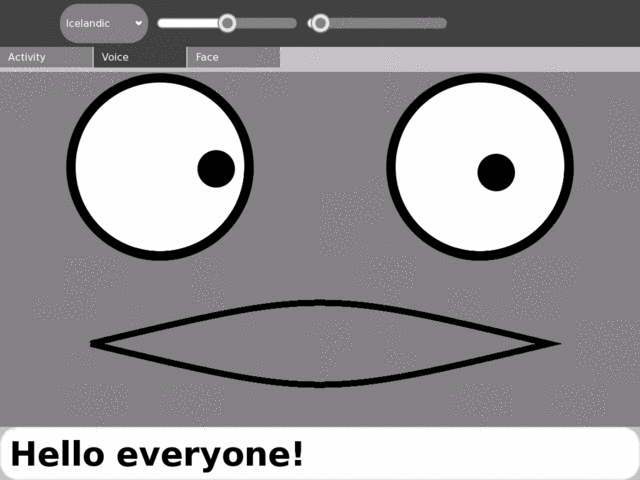Speak: Difference between revisions
No edit summary |
No edit summary |
||
| Line 15: | Line 15: | ||
| reviews = |
| reviews = |
||
| bugs = There are intermittent performance problems, especially with long sentences. |
| bugs = There are intermittent performance problems, especially with long sentences. |
||
The toolbar sliders need icons or labels so you know what they do. |
|||
| ⚫ | |||
| featurerequests = Speak should save your settings to the journal. |
|||
You should be able to draw/make new mouth and eye shapes. |
|||
| ⚫ | |||
}} |
}} |
||
Revision as of 05:40, 9 January 2008
| Speak | |
| Status: | Under development |
| Version: | 2 |
| Base: | No |
| Source: | |
| l10n: | missing |
| Contributors | |
| User:Jminor | |
Speak
A talking face for the XO laptop. Anything you type will be spoken aloud using the XO's speech synthesizer, espeak. You can adjust the accent, rate and pitch of the voice as well as the shape of the eyes and mouth.
Screenshot
Instructions
How to install
Download this .xo file from the Browse activity: Speak-2.xo
How to play
Type something and press Enter to hear it spoken aloud. Use the toolbars at the top to change the voice's accent, rate and pitch or the shape of the eyes and mouth. After you've adjusted the settings it looks nicer in full-screen mode (Press Alt-Enter to switch).
How to develop
Speak is a standard python activity that uses espeak to generate audio.
Testing (Yes)
Speak v2 has been tested on build 653 under emulation as well as on a G1G1.
Reviews
Bugs
There are intermittent performance problems, especially with long sentences. The toolbar sliders need icons or labels so you know what they do.
Feature requests
Speak should save your settings to the journal. You should be able to draw/make new mouth and eye shapes. Ideally the mouth shape should be driven by espeak's phonemes rather than the audio waveform.
